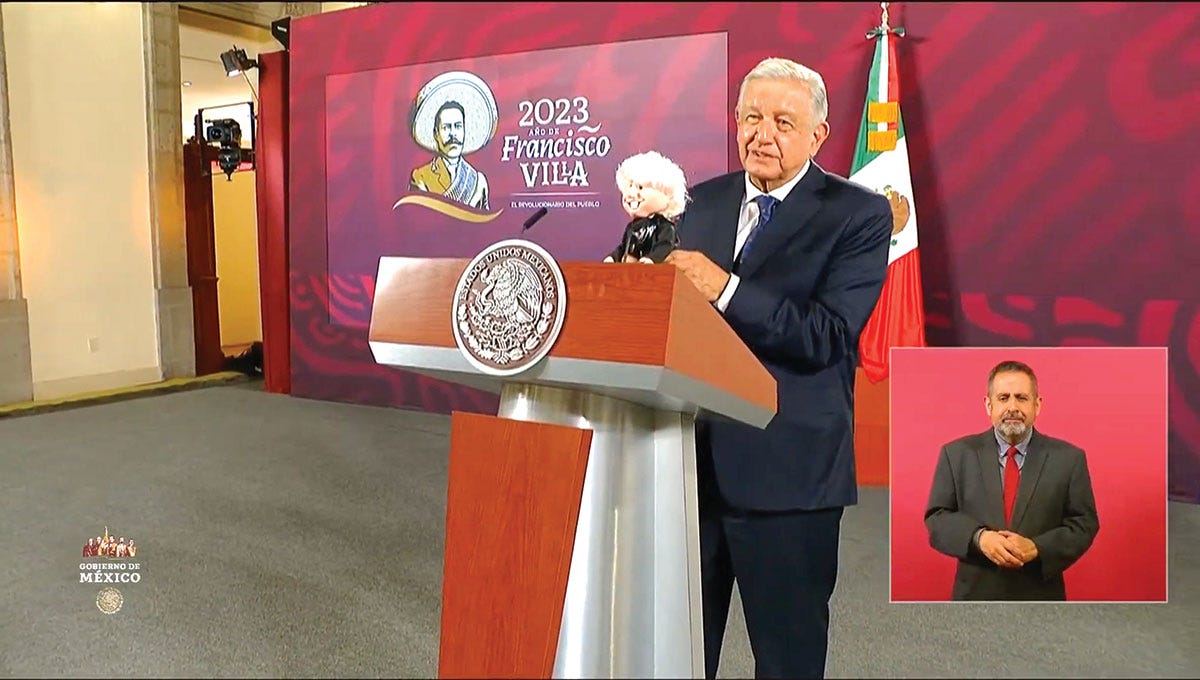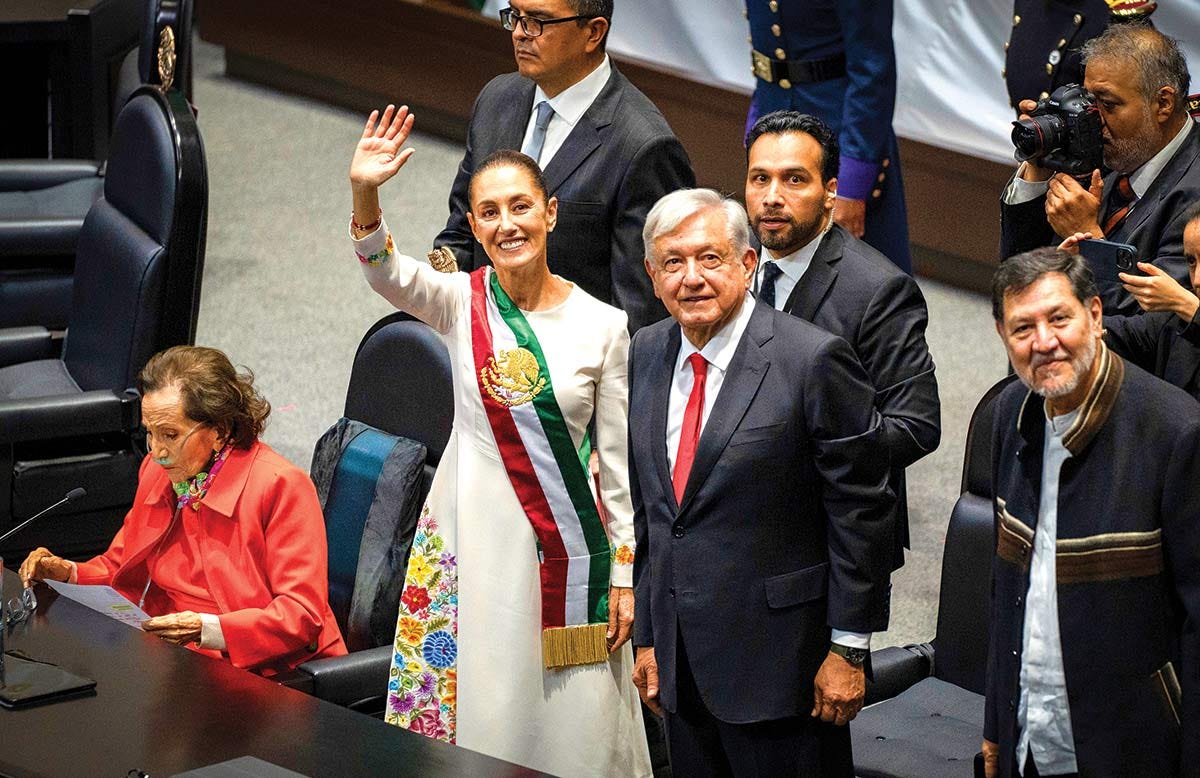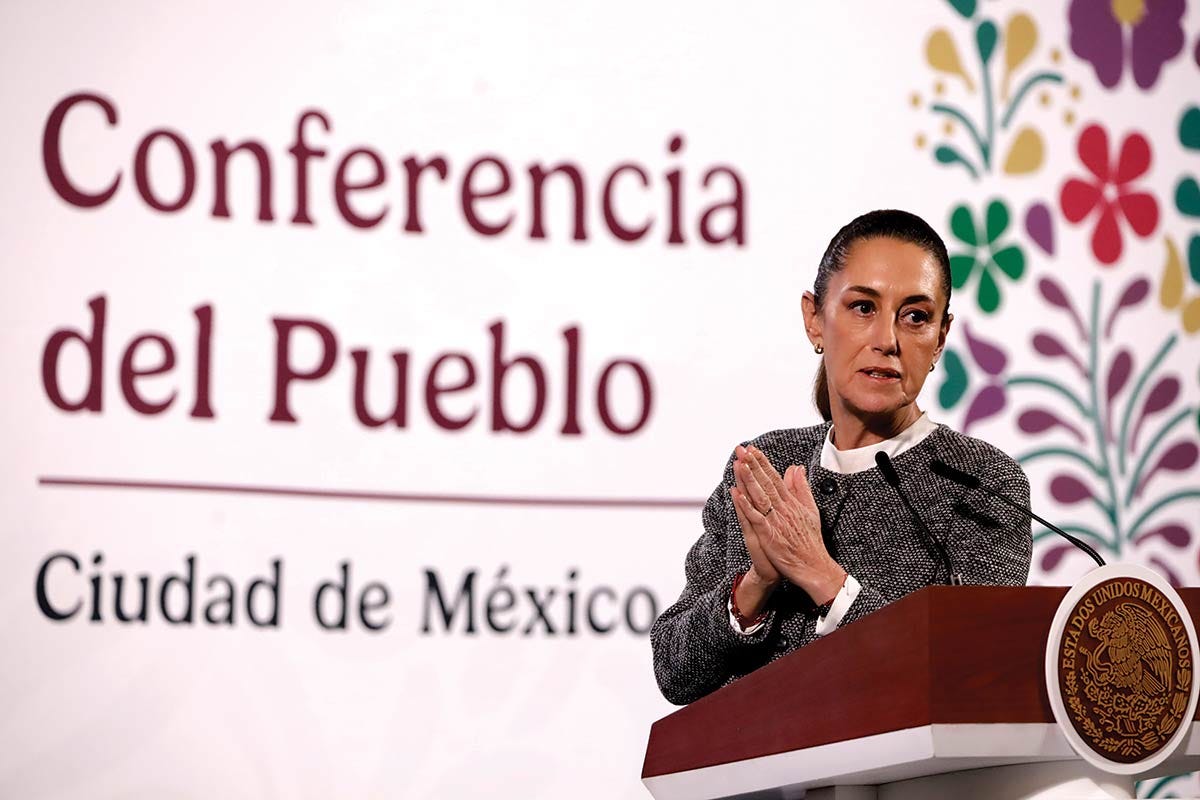Democrats Can Learn From Mexico's Left
Incumbent parties around the world keep losing to upstart challengers. Yet Mexico’s López Obrador defied the trend, handing off his presidency to Sheinbaum. What’s their secret?
In The Nation magazine, excerpted for Substack: At a time when incumbent parties around the globe are losing to upstart challengers, Mexico’s left-wing Morena party stands out as an exception. Former president Andrés Manuel López Obrador’s mañaneras—daily press conferences that fused governance with storytelling—revolutionized political communication, creating a direct, unfiltered dialogue with the public. This approach has now been embraced by Mexico’s new president, Claudia Sheinbaum, as she builds on AMLO’s legacy and looks to create her own path.
Nation editorial board member Waleed Shahid spoke with Ezra Alcázar, a political strategist and writer who works at Fondo de Cultura Económica, a prestigious Spanish-language publishing house (he is also the anchor of El Desfiladero on Canal Once), and Alex González Ormerod, a historian and journalist who leads The Mexico Political Economist, to explore how Morena’s communications strategy bypassed a hostile right-wing media, earned the trust of working-class Mexican voters, and cemented a populist agenda that reshaped the country’s political landscape.
Waleed Shahid: What is the purpose of the mañanera politically, and what lessons have you been able to learn from it?
Ezra Alcázar: [Former president] López Obrador began hosting the mañaneras back when he was mayor of Mexico City. Every morning, he’d have a press conference where he’d inform the public—well, the media—about what was happening in the city: which meetings had taken place, how security was progressing, and more. Journalists from various outlets would attend and write their stories.
López Obrador spent a lot of time not only answering the questions but also conceptualizing, from his point of view, what he was being asked. This ensured that he was directly telling the people how he interpreted things.
Alex González Ormerod: We’ve got to remember that the media in Mexico back then—and to some extent now—was corporate media, mostly leaning to the right, and then the government media, which today is in the hands of Morena but back then was in the hands of the right-wing former president Vicente Fox. So it was basically all opposition media. This was López Obrador’s way of fighting back.

Shahid: Can you give a little more flavor to what happened at these mañaneras? Most people in the United States don’t know anything about them. Was it a place to combat his vulnerabilities, to frame a message with an adversarial press? Or was it more to repeat every day what the main message was, of the campaign and of the presidency?
Alcázar: Before we started this interview, I watched López Obrador’s last morning press conference. He mostly spent the time thanking the journalists who covered him. It’s worth noting that in that last morning conference, the president raffled of his watch. That shows a bit of the tone of the morning conferences. They were very varied; it could range from a raffle with the journalists to playing a song or talking about books.
González Ormerod: People made fun of him because he’s a bit of a slow talker. He justified this by saying that if he talked too fast and misspoke, it’d become international news. But even when he was being slow, he was incredibly entertaining. He was very funny—far more sophisticated than Trump, for example. He talked directly to the people in language they could understand. This is the real challenge for Claudia Sheinbaum. She’s a completely different political animal—though not less effective, I’d say. You can see it in the way she’s broadening communications in a far [more] diversified way. I’m fascinated with her TikTok channel, for example, which I think is very millennial and Gen Z.
Shahid: In the United States, liberal elite publications like The New York Times refer to the mañaneras as Trumpian, authoritarian, Hugo Chávez–style, and anti-intellectual.
González Ormerod: Ezra and I have eternal debates about this. I did feel that there were sometimes moments where he did overstep a line, like the doxing of Natalie Kitroeff, the New York Times journalist [whose phone number López Obrador disclosed]. He never attacked journalists in the way that Trump does. He never advocated for violence. He never said, “Do terrible things to them.” But I think there were moments where he perhaps slipped up. There was a lot of to-and-fro as to how justified the doxing was. As a member of the world of journalism, to me it is important that these sorts of boundaries be respected. But, of course, breaking boundaries is part of what the mañaneras are for.
Alcázar: That’s a problem with those who set the norms for how analysis is done. We label speeches that manage to connect with the masses as “populist” or “demagogic” because they don’t use overly technical or intellectual language. I think that’s a mistake, because ultimately it’s we who aren’t learning how to communicate effectively. Because, in the end, who was that criticism directed at—the people, or at the critics themselves?
[These critics are] talking about millions and millions of people in the country… stripping these people of their capacity to be intelligent or thoughtful, as if they were being manipulated. López Obrador understood that people can’t be manipulated, but that you do have to talk to them, you have to convince them. Part of the purpose of the morning press conferences wasn’t to talk to journalists but to speak directly to the people. And I think that upset a lot of people, because it broke the tradition where, if you were a journalist or intellectual of a certain stature, you’d be invited to the presidential residence. You’d have this exclusive conversation with the president where only you would get to voice your concerns—not the concerns of the general public. The president would give you his attention, speak directly to you, and validate your importance.
I believe that the mañaneras upset intellectuals greatly because it put them on the same level as everyone else, and that’s not something they could accept. They don’t see themselves as equals to the rest of the people.
Shahid: There are three categories of people whom the Democrats have been losing for quite a long time: people who did not attend college or university; people who don’t pay attention to politics on a daily or weekly basis; and people who get their news from nontraditional sources like YouTube and TikTok. I’m curious how the mañaneras fit into that ecosystem.
Alcázar: I think those same categories exist here. There can be people who are very fixated and have a strong opinion about something, and others who don’t care at all—or they might say they don’t care at all, right? But I think the great success of López Obrador was bringing these conversations everywhere.
The other day, while I was at the International Book Fair in Guadalajara, I met a woman who told me, “I’m neither left nor right. I don’t get involved in those kinds of things.” But we ended up talking about politics for half an hour, even though she claimed not to take a stance.
González Ormerod: We’ve reached new heights in the politicization of the Mexican public. Most liberals think politicization is a bad thing—it equals polarization. López Obrador says the opposite. He says political communication and constant dialogue with the media and with the people is essential for people to understand what their interests are.
This takes us back to the politics of attention. His use of memes was hilarious. Obama does this, but it felt a lot more genuine when López Obrador shared his playlists. But he also politicized them: “It’s not like, ‘Oh, this is just a nice playlist.’ I’m sharing this music with you because I don’t want you listening to narcocorridos. I’m politicizing this list even when you thought it wasn’t political.” That, I think, was essential.
That takes us to Abre Más Los Ojos [an AMLO supporters’ group] and how that transitioned into the administration. This platform was really good at using memes and just sharing the zeitgeist of politics with people without forcing the politics down their throats.

Shahid: Can you talk a bit more about that and give us some more context?
Alcázar: What López Obrador always understood—that his main audience, the people he needed to speak to, wasn’t the traditional media but the public—was fundamental. The battlefield became the media, but now the media was the Internet, where conventional outlets didn’t know how to operate. And the people didn’t care whether they knew how to play the game or not—they just wanted to communicate their ideas.
This became essential. López Obrador often referred to “the blessed social media,” not because they bypassed the filter of hegemonic media, but because they passed only through the filter of the people. This later became structured into effective campaign mechanisms.
Shahid: There’s been a lot of discussion about how the Democrats need to focus more on economic populist issues and not get bogged down in the culture wars. Obviously, Mexican society is very different from the US, but I’m curious how both López Obrador and Sheinbaum have related to some of the issues that plague center-left parties around the world.
González Ormerod: A lot of these issues with race and gender are being resolved in Mexico as we speak through economic means. The best way to deal with issues with gender and race isn’t to say, “Let’s have a big chat”; it’s “Let’s literally just give you money.” Like, let’s just give this working woman money so she has money of her own rather than depending on the man in her family. Let’s just give these Indigenous communities money so that they can do the projects they need to do, because they know what’s best for them.
What López Obrador and Claudia Sheinbaum continue to do is to bring these issues back to economics every single time. Claudia Sheinbaum, unlike Kamala Harris, was not at all shy about saying, “I’m going to be the first woman president.” That wasn’t the issue. She said, “Because I’m a woman, I’m going to give women the economic opportunities they deserve,” and I think that was the key.
Shahid: Are the lines of political conflict in Mexico similar to those in the US?
González Ormerod: Not really. For example, López Obrador never really talked about abortion. He did a sort of states’ rights play: When it comes to abortion, Mexico’s states deal with it. Lots of very great women’s organizations are fighting the good fight on that, but I guess you’ve got to choose your battles. What unites Mexicans in general is “How are you putting food on the table?” Abortion is so important—it’s a life-or-death issue. But so is putting food on the table, and so that’s the sort of political fight you have to choose.
Shahid: One of the top issues in our election was immigration, and yet we rarely hear in American media about the Mexican side. Sheinbaum recently made her first inroads into American media vis-à-vis Trump. I’m curious how it all plays out in the Mexican landscape.
González Ormerod: The Mexican side of things is the only side of things. One of the most shocking statistics you can compare is detentions versus deportations. It’s a sort of tricky distinction, but I think it’s important. Deportation from the US means you get kicked out of the US. Detentions in Mexico mean you’re stopped and moved back to the south. They call it the carousel—they grab you in Tijuana, and they take you all the way to the south of Mexico. And that’s Mexico’s migration policy.
Biden and Trump, despite all the rhetoric, have deported far fewer people than Bush or Obama did. But Mexico has been detaining more people in recent years than ever before—it hit a record of over a million detentions in 2024. That’s far more than the low hundreds of thousands deported from the US.
When people say, “Oh, JD Vance is preparing concentration camps for the million people he wants to deport every year,” that’s the same number of detentions Mexico had in 2024. Mexico is on the roads intercepting migrants. It’s a completely different story from deportations, but we’re looking at very similar numbers, and it’s being done by Mexico violating human rights and killing people. I think that’s one of the biggest blemishes on the Mexican government at the moment. It’s arguably because they’re being forced to by the US government, but it’s pretty brutal. They’re very keen on saying, “No, we want migrants—we like migrants.” They’re not like Kamala or Trump saying, “Don’t come” or “They’re terrible people.”
Shahid: So what’s your analysis of the US landscape, where there’s a debate about whether Harris and Biden should have been tougher on asylum seekers and migrants?
González Ormerod: We’re always trying to catch up to the right and say, “We also hate migrants, just not as much.” I think you need to really push on the fact that we love migrants. Migrants are an indicator of a country’s success. Why are we not focusing on the companies hiring undocumented migrants? We’re always criminalizing the migrants, but what happens to Texas if you take away all the migrants? The economy will collapse.
We saw this in Georgia a few years ago and in Florida more recently. There was a mini version of the deportation strategy, and you had American farmers crying because their fruit was rotting in the fields. It’s not just these folks who are going to be sad—it’s going to be you when you look at how expensive food is. You need migrants desperately, and it’s the fact that you’ve criminalized them that makes it a bad situation. The crisis isn’t because they’re coming; the crisis is because you’ve criminalized them.
Alcázar: There was a moment in 2020 when the feminist movement was at a very significant peak in Mexico, and [to my recollection] López Obrador was being asked to adopt inclusive language—to which he responded that it wasn’t his way of speaking.
In the end, we realized that the only way to challenge him was from the left. And that included feminist issues, trans issues, and, at times, a certain sophistication in addressing the issues of Indigenous peoples. These were really challenging.
However, I think that now Sheinbaum has incorporated all these issues into her main agenda. For example, environmental issues are so important to her, because that’s where she comes from. On the other hand, López Obrador’s phrase “First, the poor” has been transformed into “First, indigenous, Afro-Mexican, and poor women.” Once again, she addresses what was missing in López Obrador’s approach by arguing, “Yes, of course the poor come first, but we must understand that within that universe of poverty, women are a step below because they carry additional burdens.” All of this is accompanied by the idea of “All rights for all people.”
This is very difficult to reconcile within such a broad coalition, because just as there are people who support all rights for the trans community, there are also people within Morena who don’t support them. However, the message remains unified, and certain rights are pursued. I think they are making some progress there.
We must add the issue you mentioned regarding crime, where there has been a complete shift. Perhaps López Obrador’s “hugs, not bullets” approach became very problematic—not because it meant embracing drug traffickers, but because it sought to move away from direct confrontation. That was something we’d experienced under Felipe Calderón, and it was extremely violent for our country. However, the discourse must change intelligently, and we must create a way to work together with the entire state apparatus for it to function. I think progress is being made.
González Ormerod: López Obrador could spin a question about macroeconomics and talk about his grandfather, and everyone would love it. Sheinbaum tries to answer these questions in good faith, and I think she’s still missing that sort of… I don’t want to call it magic, but sometimes people try to get her on the technical side because she comes from a scientific background. I’m sure a lot of people would say it’s sexism and people demanding more of her, but I think it’s also just the fact that she tackles the questions in good faith.
Bloomberg asked her how she would deal with inflation if it goes up with the tariffs. She went off on this answer that was pretty unsatisfactory, because it made it seem like she didn’t have a plan. Mexico does have a plan. They’ve capped prices on basic goods in the market, and they’re giving out money so that people who are really poor won’t want for anything. Every single policy that Mexico has is basically an anti-inflationary policy. So she could have gone for that.

Shahid: We’ve all experienced one Trump term, and most of Mexico-US relations, at least in the first year, were about the border wall. I think this time around the focus is going to be on mass deportations and tariffs. I’m curious how you think that will impact Morena’s communications strategy and Mexican politics in general.
González Ormerod: One of the key things to understand is the US has the world to run in its own mind. It’s focused on every country in the world that it cares about. Mexico only really has one priority: the United States. Everyone makes it seem like Mexico is reacting to Trump. Mexico has been preparing for Trump since before he was elected, for two reasons. One, people assumed he was going to be elected. But the Democrats aren’t much better—the narrative changes, but a lot of the policy stays the same. We saw that with the children in cages. Post-Trump, the children stayed in cages—it’s just that liberal media stopped focusing as much on that.
I think they can do better. Private industry, NGOs, and the government need to sit down to talk about how they’re going to incorporate a lot of these migrants. Maybe lots of them want to go home, but lots of them probably want to stay, and you can incorporate them into the Mexican economy, which does actually need a lot of labor. We can make the most of this crisis. It is far more expensive for a company, and far less profitable, to have an empty space than to retrain someone and eventually, hopefully regularize them in terms of their documentation. So if Mexico can beat America to the punch, it can be a new economic boom.
Shahid: Last question. What do you think is one major lesson Democrats can learn from the experience of Morena, López Obrador, and Sheinbaum?
Alcázar: I think that phrase from López Obrador—“First, the poor”—is fundamental to understanding the need to focus on people’s most basic needs. This is crucial because, without it, people can’t stop worrying about living day to day. I mean, if I have to spend half the month figuring out how to put food on the table or pay the rent, I won’t be able to focus on the rest of my needs.
Yes, it’s important for women to have all their rights. Yes, it’s important for trans people to be understood. I won’t pay attention to environmental issues or anything else if I’m constantly trying to figure out how to make it to the end of the month. The focus this government has placed on the poorest is essential to building your project with the people. Not to winning over the media, because you’re unlikely to win there, as they have their own agenda. You have to win with the people—and ensure they are the ones countering opposing narratives. That is the great success they have achieved.
González Ormerod: Something we didn’t talk about, but which is probably the most important thing: Take to the streets. Go and speak to people where they are. That’s what most of the successful politicians have done over the past few years in Mexico. Claudia Sheinbaum’s instruction, which is a nice quip, is “Más territorio, menos escritorio.” Don’t hit the books, hit the pavement.
It’s good to get your message out, but you need to know what people actually want from you. I think Democrats are very used to lecturing people. I think Kamala Harris lost when she said, “I’m speaking.” She never stopped. She never listened. And I think that’s really important.





The main thing to learn is that developing countries are easy to please. Things get a lot more complicated when people get wealthier and start voting based on culture.